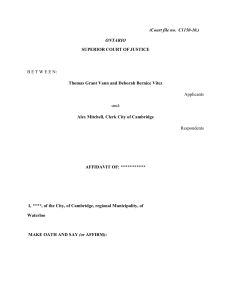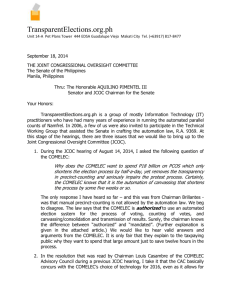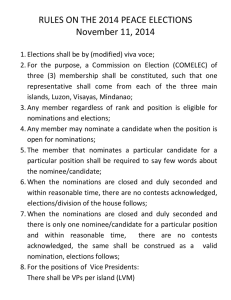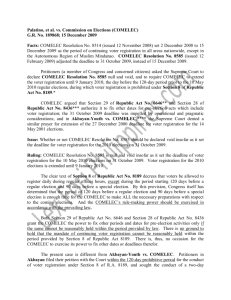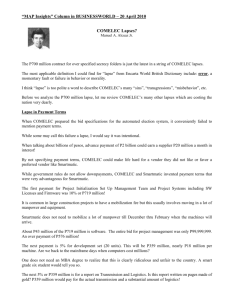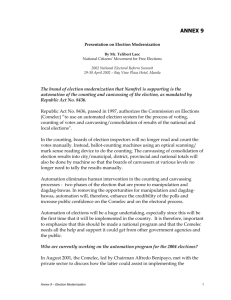as of March 20
advertisement
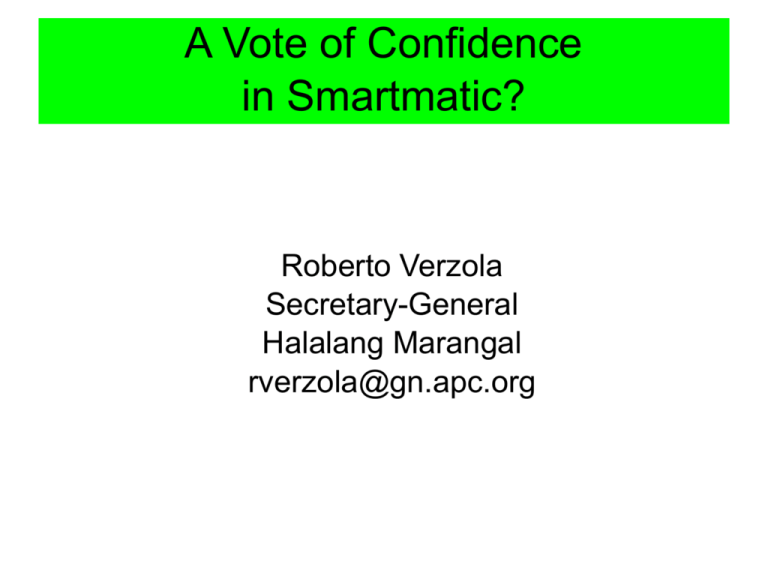
A Vote of Confidence in Smartmatic? Roberto Verzola Secretary-General Halalang Marangal rverzola@gn.apc.org March 8: Smartmatic full-page ad Last March 8, 2010 a full-page ad by Smartmatic-TIM came out in several national dailies. The ad was entitled “A Vote of Confidence for the 2010 Elections” Hardware / supplies / consumables 82,200 PCOS manufactured, delivered 1,722 canvassing and consolidation servers and printers delivered 1,722 power generators delivered 180,640 compact flash memory cards purchased 82,200 batteries for each PCOS delivered 338,750 rolls for printing 30 copies of ER per pcnt delivered 82,200 PCOS made, delivered Note the careful omission: manufactured in China, delivered in Manila, but no mention of full testing and acceptance by the Comelec Omission creates false impression of readiness In 2004, thorough testing of 1,990 counting machines took 3 months (source: Comelec Comm. Mehol Sadain, a HALAL convenor) 1,722 canvassing and consolidation servers and printers delivered No mention of test results or Comelec acceptance 1,722 power generators delivered No mention of test results or Comelec acceptance 180,640 compact flash memory cards purchased Each machine uses two memory cards 82,200 PCOS machines, including backups 82,200 x 2 = 164,400 memory cards needed 180,640–164,400 = 16,240 extra memory cards There are only 75,471 precinct clusters Warning: potential capability to substitute memory cards in 21.5% of PCOS machines Hardware / supplies / consumables Unknown test results: 82,200 PCOS and batteries 1,722 canvassing and consolidation servers, printers, generators 180,640 compact flash memory cards; at least 20% more than necessary PROBABILITY OF SUCCESS: 80% Software / certifications / voter education Source code customization finished Source code in escrow at BSP System audit internationallyrecognized certification entity finished Source code public review process opened Successful field tests and mock elections Voter education websites launched Voter educn TV and radio infomercials Source code customization finished “Customization” included disabling of voter verification and confirmation feature which is built into the PCOS machine. This feature would have displayed the names of candidates marked in the ballot. Voters must then confirm through a CAST button that their ballot was scanned accurately. It assures voters that their votes were scanned accurately. This feature was disabled. Source code in escrow at BSP Source code is Smartmatic's general instructions directed to every machine No mention of source code certification by Systest, for which Comelec paid P72 million No mention of any certification document, or of the full Systest report, on its source code review Insiders cite “series of written exchanges” between Systest and Comelec about the review Release the full text of the Systest review NOW System audit by internationallyrecognized certification entity System audit covers not only the source code but all the five sub-systems essential to AES success Smartmatic claims “finished”. But no certification, much less a full report, has been released to the public. Full audit report must be released. Source code public review process opened Process is highly restrictive and makes a review extremely difficult So far, no group has managed to conduct a code review Successful field tests and mock elections WHAT A LIE! High ballot rejection rates (light shading of ovals should not cause ballot rejection) Transmission problems even in Metro Manila Blackout on machine accuracy/error rates A contractor that will put such a lie in a full-page ad can lie about anything Software / certifications / voter education System audit and source code review: no full text report or certification released Source code public review: no local group has done a code review Successful field tests and mock elections: What a lie! PROBABILITY OF SUCCESS: 70% Logistics / Support / Preparations 28 multinational experts at the PMT 327 qualified Filipino organic employees Over 36,000 voting centers surveyed for signal, power, etc. 438 Comelec trainers 23,000 sqm central warehouse and config facility operational Contracts with logistics providers, forwarders signed Recruitment, training of 48,000 field techs started Over 36,000 voting centers surveyed for signal, power, etc. Since there are 48,000 voting centers only 75% have been covered 904 test and config line employees working two shifts Tests needed Burn-in of machines, batteries, generators, etc. Full testing of batteries: will they last at least 12 hrs? Testing for failures rates and mean time between failures (MTBF) Testing for ballot rejection rates Testing for scan accuracy/error rates (should be less than 5 per 100,000 marks) In 2004, testing 1,990 machines took 3 months Contracts with logistics providers, forwarders signed Relative unknowns. Have you heard of the ff? (Malaya, 15 March 2010)? Germalin Enterprises (P2.3M 2006 net income) Agro Intl Forwarders (P3.7M 2008 retained earnings) ACF Logistics Worldwide (P1.1M 2008 cash balance) Assuming a delivery team of 3, at least 200,000 delivery personnel needed for 75,471 clusters Recruitment, training of 48,000 field techs started 48,000 field technicians for 75,471 machines? 438 Comelec trainers For 226,000 BEI members? Logistics / Support / Preparations Over 36,000 voting centers surveyed: 75% coverage 438 Comelec trainers: 260,000 BEIs to train Logistics providers, forwarders: unknowns Recruitment, training of 48,000 field techs: only started PROBABILITY OF SUCCESS: 80% Telecommunications and Transmission 48,000 modems delivered 46,000 SIM cards secured 5,500 BGAN mobile sat xmtrs purchased 680 VSAT mobile sat xmtrs leased 2 data centers for backup of nationwide results with redundancy secured Contract with major telcos to provide VPN for transmitting results secured 48,000 modems delivered For 75,471 machines? (63.6%) How many of them can actually get a signal in the field? 46,000 SIM cards secured False security: Smartmatic generates passwords, issues digital certificates, verifies the certificates, and operates the machines This is like merging in a single person the functions of accountant, cashier, auditor, operator and vendor! 5,500 BGAN mobile sat xmtrs purchased 48,000 + 5,500 = 53,500 680 VSAT mobile sat xmtrs leased 53,500 + 680 = 54,180 (for 75,471 machines, or 71.8%) 2 data centers for backup of results with redundancy secured Data centers in secret locations which the Comelec refuses to reveal to the public This is equivalent to conducting a canvass in a secret place only the Comelec and Smartmatic know Contract with major telcos to provide VPN for transmitting results secured According to Smartmatic's own field surveys, only 70% of voting centers have reliable signals Telecommunications and Transmission 46,000 SIM cards: for 48,000 modems? 48,000 modems; 5,500 BGAN; 680 mobile sat transmitters: for 75,741 machines? (72%) Contract with major telcos: 70% coverage 2 data centers for backup: secret locations PROBABILITY OF SUCCESS: 70% Ballot Printing Infrastructure Delivered to COMELEC and NPO 4 high-speed digital printers 1,500 metric tons of ballot paper 9,380 liters of ink Over 10 million ballots with security marks (invisible ultraviolet mark and unique barcode) printed Over 10 million ballots with security marks (invisible ultraviolet mark and unique barcode) printed Ballot printing begins after a half-day delay C. LAPEÑA, K. J. TAN, GMANews.TV 02/08/2010 | 02:11 PM The printing of ballots for the May 2010 elections has finally begun after “technical considerations" hampered the process, the Commission on Elections (Comelec) said Monday. This was announced by Commissioner Gregorio Larrazabal at 1 p.m. after printing was delayed by more than half a day. Confidential March 1 Comelec memo on ballot printing problem ... The Comelec memorandum noted that as of March 1, some 7.9 million ballots for the electronic balloting had been printed. Of the number, 5.3 million were accepted as “good ballots,” while the rest have yet to be checked. “Granting that 7,878,480 are all good ballots, we still have to print a total of 42,845,254 for a period of 54 days. This means, we should be able to have a daily production of 793,430,629, more or less, per day from four printers, which is impossible!” the memorandum read. Smartmatic-TIM has leased to the commission four Kodak VersaMark VL 4000 printers, each capable of printing 200,000 ballots. Ladra said the printers’ daily output was only 650,000 or 162,500 each. At this capacity, she said only 34.1 million ballots would be printed by April 25, when the Comelec starts to ship out the ballots. (PDI report, 10Mar2010) 7.9 million ballots printed from Feb. 8 to Mar. 1 Dates Days Ballots Rate 2/8 – 3/1 20 7.9 million 394,000/day assuming the same printing rate... 3/2 – 4/30 60 21.3 million 7.9 million + 21.3 million = 39.2 million If the remaining 10.8 million ballots are printed at the same rate, they will be finished on May 27 1,600 print jobs in 80 days Each municipality/city has its own ballot design Each ballot design is one print job 1,600 print jobs in 80 days is 20 print jobs per day What if a printing error is made? Do candidates verify if their names are accurately positioned? (Due diligence!) 4 high-speed digital printers According to insiders, these special Kodak printers are not available off-the-shelf. Kodak makes them only when orders are received Over 10 million ballots with security marks (invisible ultraviolet mark and unique barcode) printed Ultraviolet scanning capability disabled, according to CJ Panganiban (UV mark is a security feature) ARMM ballots minus NPO security mark Over 10 million ballots with security marks (invisible ultraviolet mark and unique barcode) printed PROBABILITY OF SUCCESS: 80% Expected probabilities of success, as of March 8 Smartmatic ad Sub-project PoS Hardware and supplies 80% Software and certifications 70% Logistics and support 80% Telecomms and transmission 70% Ballot printing 80% Basic Principle of Project Management (and Reliability Engineering) To get the overall probability of success of a project with a series of sub-projects, each one essential to overall project success, multiply together each sub-project's probability of success: .8 x .7 x .8 x .7 x .8 = ? If each subproject had 99% chances of success... .99 x .99 x .99 x .99 x .99 = .95 If each subproject had 95% chances of success... .95 x .95 x .95 x .95 x .95 = .77 If each subproject had 90% chances of success... .9 x .9 x .9 x .9 x .9 = .59 If each subproject had 87% chances of success... .87 x .87 x .87 x .87 x .87 = .498 If each subproject had 80% chances of success... .8 x .8 x .8 x .8 x .8 = .33 Estimated AES chances of success, as of March 8 ad by Smartmatic .8 x .7 x .8 x .7 x .8 = .25 Will Smartmatic vote on behalf of the Filipino people? The March 8 ad implies that voters have given Smartmatic solid votes of confidence in each of their five automation sub-projects. Smartmatic marked those ovals, not the voters. Will Smartmatic, a foreign company, also speak for Filipino voters on May 10? I. The COMELEC should ... Make public test protocols and test results of every machine, particularly the mean time between failures, ballot rejection rates, and scan accurary rates Allow pol parties to test some machines themselves Not accept, deploy or pay for machines which do not meet specifications – simple due diligence Distribute machines randomly: what if bad machines are sent to opposition bailiwicks? Embargo the 16,240 extra memory cards II. The COMELEC should ... Reenable voter verification and confirmation if ballot was scanned accurately by the machine Make public Systest certification and full reports on the system audit and source code review Provide stakeholder access to the source code on the same terms and conditions as Systest Make public the series of exchanges between Comelec and its Technical Evaluation Committee (TEC) and Systest III. The COMELEC should ... Make public the transmission and power availability survey report of Smartmatic Make public the list of field offices of all forwarding firms contracted by Smartmatic Make public the contracts with forwarding firms Make public the latest version of its machine testing, ballot printing, delivery and training timelines IV. The COMELEC should ... Make public detailed continuity plan for areas with weak or no signals, or where transmission failures occur Make public copy of contracts with telcos Open to the public Comelec data servers site Transfer digital security management from Smartmatic to independent third party (DOST?) V. The COMELEC should ... Grant observer status to political parties in the ballot printing committee Conduct random testing of ballots for quality, machine readability and rejection rates Allow political parties to inspect and test ballot batches themselves To political parties and the public: beware of ... Location-specific “problems”, authentic or not: Regional variations in delivery capabilities, quality/reliability of counting machines, modems, batteries, servers, electricity, generators, telco signals, ballots availability, conduct of trainings, etc. These variations can bias voter turnout in favor of some candidate bailiwicks over others Ballot fraud in millions: it is easier with shading ovals than writing names Reducing the risk of failure All proposals for ensuring transparency in the AES must be heeded Every precinct must be authorized and prepared to count votes manually in cases of machine delay or failure, valid but rejected ballots and for a post-election manual audit Full parallel count by a consortium of citizens' groups based on one of the 8 official ER copies must be authorized and done in public Options in case of failure... Orderly constitutional transition must be ensured, if no president, vice-president or senators are proclaimed Clarify the role of such interim post-GMA government in settling election disputes or even possibly conducting new, credible elections Turbulent times are coming Pray for the best Prepare for the worst
